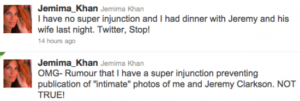The latest fuss over Twitter revealing the details of a footballer’s and a “world-famous” actor’s affairs, despite superinjunctions, is nothing new.
The biggest problem is that the lawyers involved didn’t seem to think it’s necessary to tell Google or Twitter that an injunction exists (and they can’t tell Twitter anyway as it doesn’t have a UK office …)
This means that once the information is out, it’s easy to find it by typing the relevant people’s named into Google or Twitter search (with collateral damage to people named who aren’t involved).

False rumours also denied on Twitter
In the John Terry superinjunction case, you could find out the details via Google real-time search just by typing his name into Google. No one had told Google of the injunction.
With the Alfie Patten injunction, Google News listed foreign news outlets that revealed the details of the case (the lawyers didn’t bother sending the injunction to Google) – and various UK sites also published the info including Brand Republic and Walt Disney and (indirectly) ITV because they didn’t know it existed.
And blogs routinely breach the terms of these injunctions but a catch-22 prevents them from knowing this as Fred Goodwin found.
Is there anyone who doesn’t know the football and actor in the latest cases – especially when one weekend newspaper directly compared the two names for their relationships with their wives …? If the lawyers want to keep these names secret, maybe start with learning how the internet works?
You might also like
- Google Instant filters put gay and lesbian on a par with rape, racism and paedophilia
- How to work out what Google Instant means for your business
- Google Instant keyboard navigation increases likelihood of clicking PPC ads
- Google autocomplete now fixes spelling problems
- Google puts the anal in analytics
Leave a comment!
![Super injunctions and Twitter: Alfie Patten, John Terry, [redacted] and [redacted]](https://malcolmcoles.co.uk/wp-content/uploads/2021/12/khan-550x186-1-2.png)